BTEC Research Project: Line Manager and Leader Roles at ALDI
VerifiedAdded on 2022/11/23
|34
|6251
|438
Report
AI Summary
This research project analyzes the roles of line managers and leaders in employee development and wellbeing within ALDI. The study aims to examine the requirements of line managers and leaders in employee development, investigate their responsibilities in talent management, and analyze the challenges they face. The research employs a positivism philosophy and a deductive approach, using a questionnaire as the primary data collection method from a sample of 30 ALDI employees. The findings reveal that line managers and leaders are crucial for employee development, including providing guidance, communicating information, and fostering internal promotions. The research also identifies challenges such as high employee turnover and a lack of leadership, and suggests strategies for overcoming these, such as adopting change management models and developing accurate leadership styles. The report includes a literature review, research methodology, data analysis, and recommendations, offering insights into effective talent management within the company.
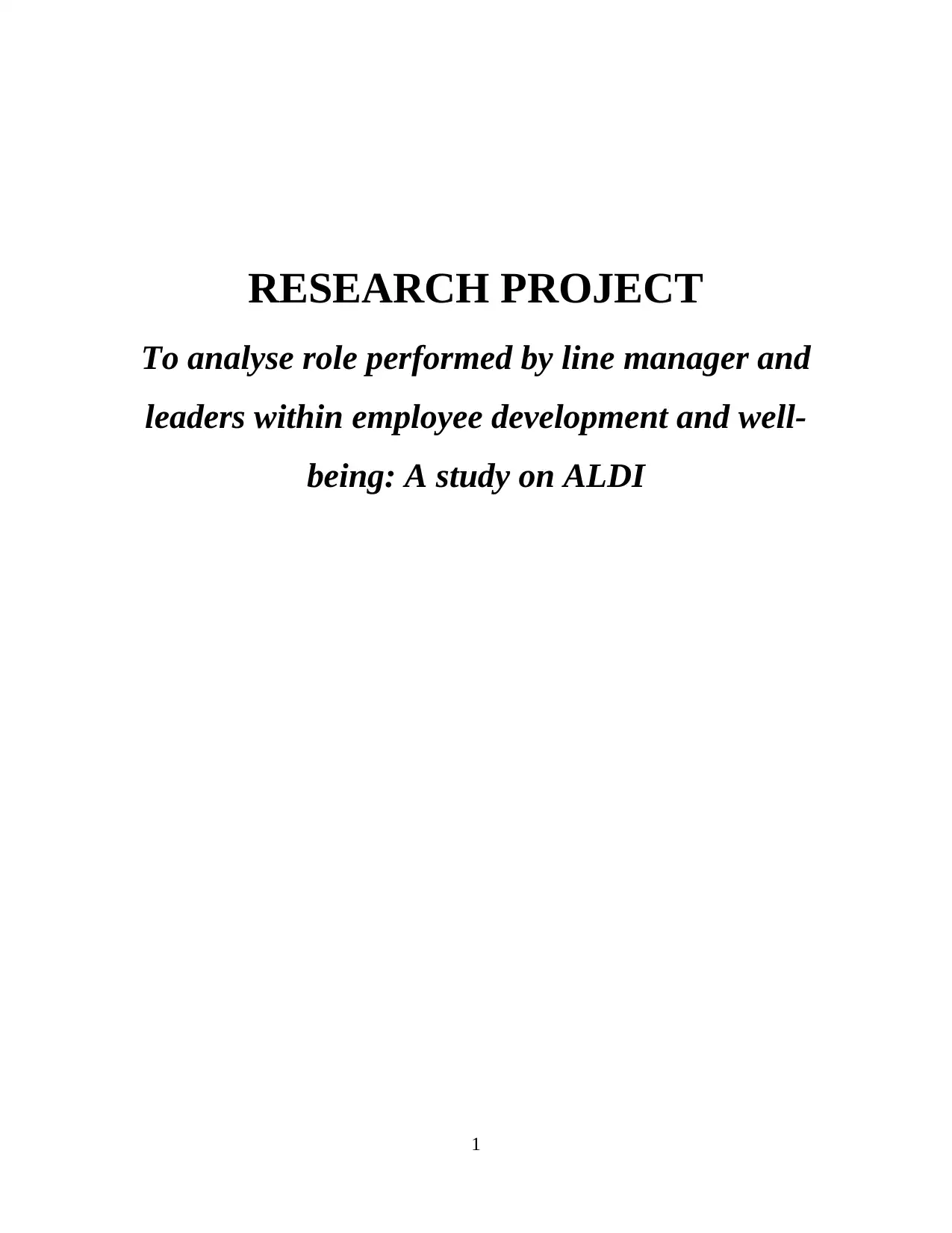
RESEARCH PROJECT
To analyse role performed by line manager and
leaders within employee development and well-
being: A study on ALDI
1
To analyse role performed by line manager and
leaders within employee development and well-
being: A study on ALDI
1
Paraphrase This Document
Need a fresh take? Get an instant paraphrase of this document with our AI Paraphraser
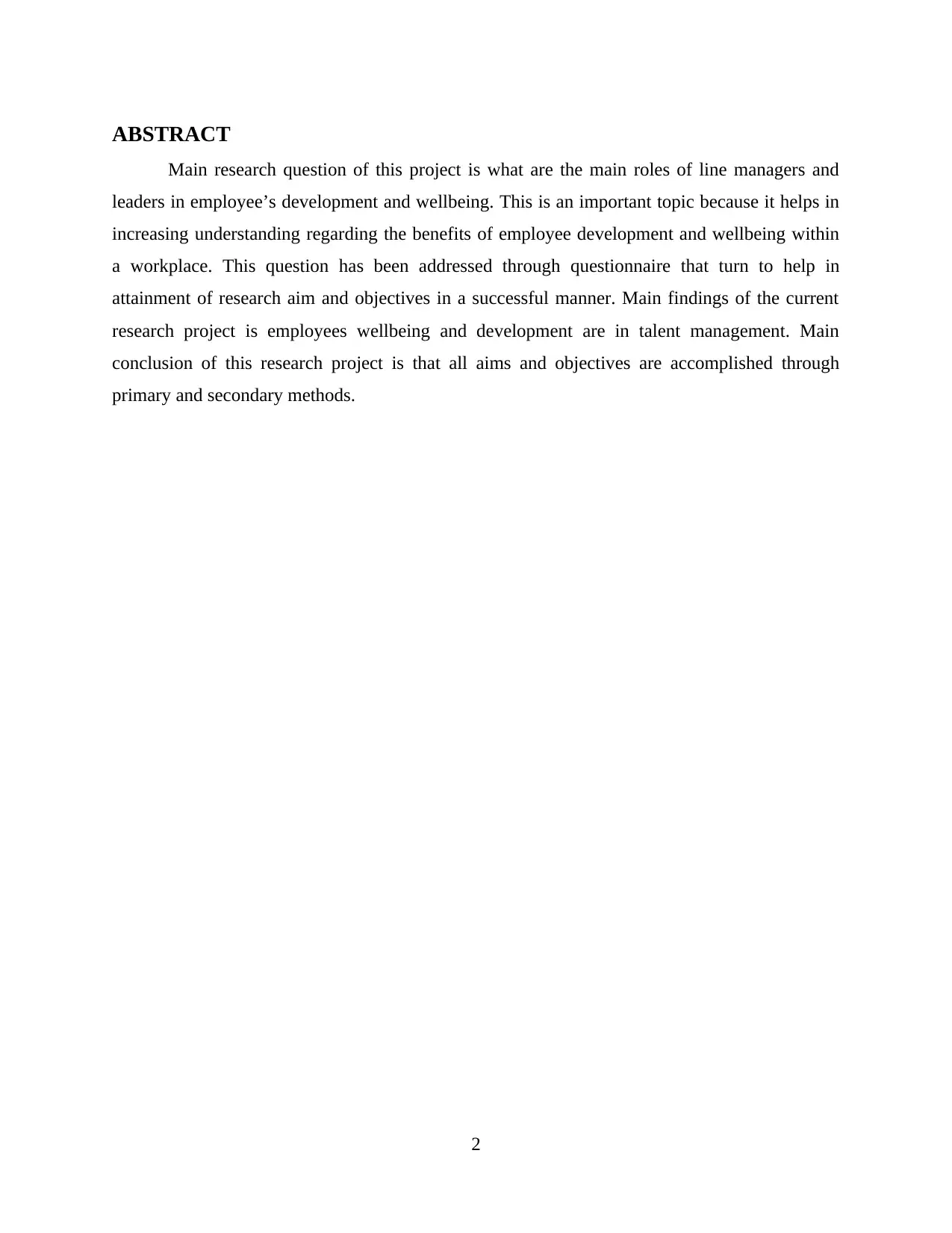
ABSTRACT
Main research question of this project is what are the main roles of line managers and
leaders in employee’s development and wellbeing. This is an important topic because it helps in
increasing understanding regarding the benefits of employee development and wellbeing within
a workplace. This question has been addressed through questionnaire that turn to help in
attainment of research aim and objectives in a successful manner. Main findings of the current
research project is employees wellbeing and development are in talent management. Main
conclusion of this research project is that all aims and objectives are accomplished through
primary and secondary methods.
2
Main research question of this project is what are the main roles of line managers and
leaders in employee’s development and wellbeing. This is an important topic because it helps in
increasing understanding regarding the benefits of employee development and wellbeing within
a workplace. This question has been addressed through questionnaire that turn to help in
attainment of research aim and objectives in a successful manner. Main findings of the current
research project is employees wellbeing and development are in talent management. Main
conclusion of this research project is that all aims and objectives are accomplished through
primary and secondary methods.
2
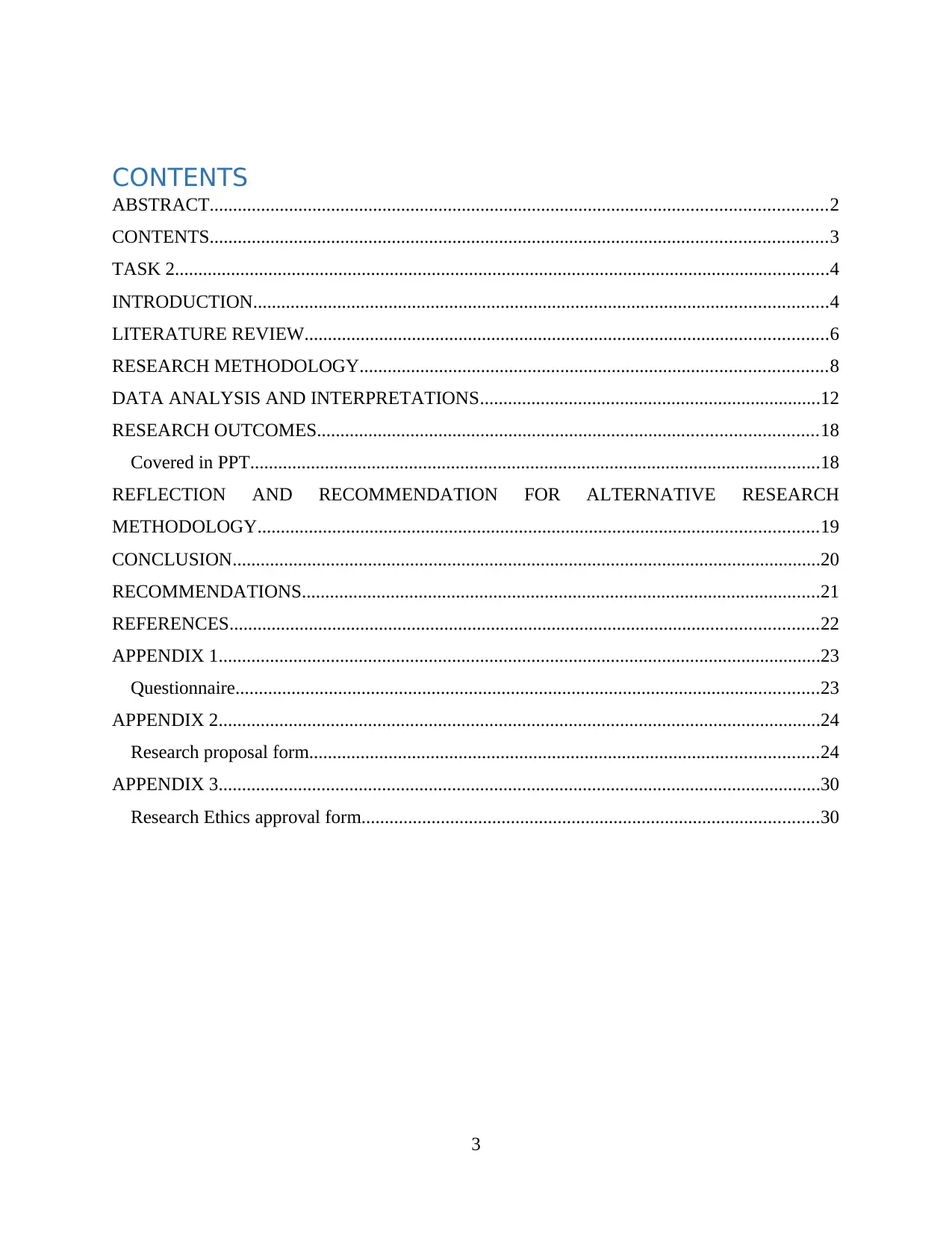
CONTENTS
ABSTRACT....................................................................................................................................2
CONTENTS....................................................................................................................................3
TASK 2............................................................................................................................................4
INTRODUCTION...........................................................................................................................4
LITERATURE REVIEW................................................................................................................6
RESEARCH METHODOLOGY....................................................................................................8
DATA ANALYSIS AND INTERPRETATIONS.........................................................................12
RESEARCH OUTCOMES...........................................................................................................18
Covered in PPT..........................................................................................................................18
REFLECTION AND RECOMMENDATION FOR ALTERNATIVE RESEARCH
METHODOLOGY........................................................................................................................19
CONCLUSION..............................................................................................................................20
RECOMMENDATIONS...............................................................................................................21
REFERENCES..............................................................................................................................22
APPENDIX 1.................................................................................................................................23
Questionnaire.............................................................................................................................23
APPENDIX 2.................................................................................................................................24
Research proposal form.............................................................................................................24
APPENDIX 3.................................................................................................................................30
Research Ethics approval form..................................................................................................30
3
ABSTRACT....................................................................................................................................2
CONTENTS....................................................................................................................................3
TASK 2............................................................................................................................................4
INTRODUCTION...........................................................................................................................4
LITERATURE REVIEW................................................................................................................6
RESEARCH METHODOLOGY....................................................................................................8
DATA ANALYSIS AND INTERPRETATIONS.........................................................................12
RESEARCH OUTCOMES...........................................................................................................18
Covered in PPT..........................................................................................................................18
REFLECTION AND RECOMMENDATION FOR ALTERNATIVE RESEARCH
METHODOLOGY........................................................................................................................19
CONCLUSION..............................................................................................................................20
RECOMMENDATIONS...............................................................................................................21
REFERENCES..............................................................................................................................22
APPENDIX 1.................................................................................................................................23
Questionnaire.............................................................................................................................23
APPENDIX 2.................................................................................................................................24
Research proposal form.............................................................................................................24
APPENDIX 3.................................................................................................................................30
Research Ethics approval form..................................................................................................30
3
⊘ This is a preview!⊘
Do you want full access?
Subscribe today to unlock all pages.

Trusted by 1+ million students worldwide
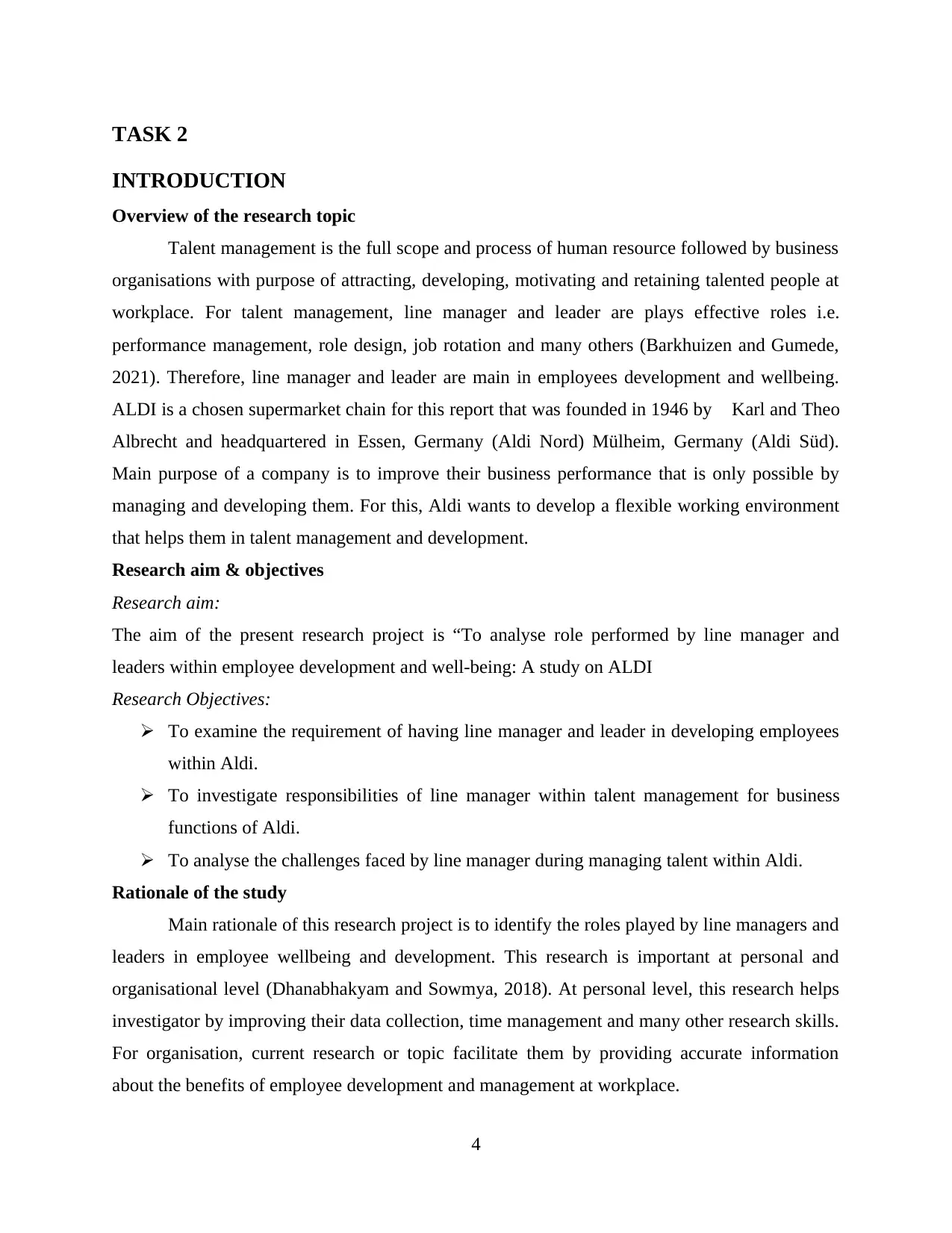
TASK 2
INTRODUCTION
Overview of the research topic
Talent management is the full scope and process of human resource followed by business
organisations with purpose of attracting, developing, motivating and retaining talented people at
workplace. For talent management, line manager and leader are plays effective roles i.e.
performance management, role design, job rotation and many others (Barkhuizen and Gumede,
2021). Therefore, line manager and leader are main in employees development and wellbeing.
ALDI is a chosen supermarket chain for this report that was founded in 1946 by Karl and Theo
Albrecht and headquartered in Essen, Germany (Aldi Nord) Mülheim, Germany (Aldi Süd).
Main purpose of a company is to improve their business performance that is only possible by
managing and developing them. For this, Aldi wants to develop a flexible working environment
that helps them in talent management and development.
Research aim & objectives
Research aim:
The aim of the present research project is “To analyse role performed by line manager and
leaders within employee development and well-being: A study on ALDI
Research Objectives:
To examine the requirement of having line manager and leader in developing employees
within Aldi.
To investigate responsibilities of line manager within talent management for business
functions of Aldi.
To analyse the challenges faced by line manager during managing talent within Aldi.
Rationale of the study
Main rationale of this research project is to identify the roles played by line managers and
leaders in employee wellbeing and development. This research is important at personal and
organisational level (Dhanabhakyam and Sowmya, 2018). At personal level, this research helps
investigator by improving their data collection, time management and many other research skills.
For organisation, current research or topic facilitate them by providing accurate information
about the benefits of employee development and management at workplace.
4
INTRODUCTION
Overview of the research topic
Talent management is the full scope and process of human resource followed by business
organisations with purpose of attracting, developing, motivating and retaining talented people at
workplace. For talent management, line manager and leader are plays effective roles i.e.
performance management, role design, job rotation and many others (Barkhuizen and Gumede,
2021). Therefore, line manager and leader are main in employees development and wellbeing.
ALDI is a chosen supermarket chain for this report that was founded in 1946 by Karl and Theo
Albrecht and headquartered in Essen, Germany (Aldi Nord) Mülheim, Germany (Aldi Süd).
Main purpose of a company is to improve their business performance that is only possible by
managing and developing them. For this, Aldi wants to develop a flexible working environment
that helps them in talent management and development.
Research aim & objectives
Research aim:
The aim of the present research project is “To analyse role performed by line manager and
leaders within employee development and well-being: A study on ALDI
Research Objectives:
To examine the requirement of having line manager and leader in developing employees
within Aldi.
To investigate responsibilities of line manager within talent management for business
functions of Aldi.
To analyse the challenges faced by line manager during managing talent within Aldi.
Rationale of the study
Main rationale of this research project is to identify the roles played by line managers and
leaders in employee wellbeing and development. This research is important at personal and
organisational level (Dhanabhakyam and Sowmya, 2018). At personal level, this research helps
investigator by improving their data collection, time management and many other research skills.
For organisation, current research or topic facilitate them by providing accurate information
about the benefits of employee development and management at workplace.
4
Paraphrase This Document
Need a fresh take? Get an instant paraphrase of this document with our AI Paraphraser
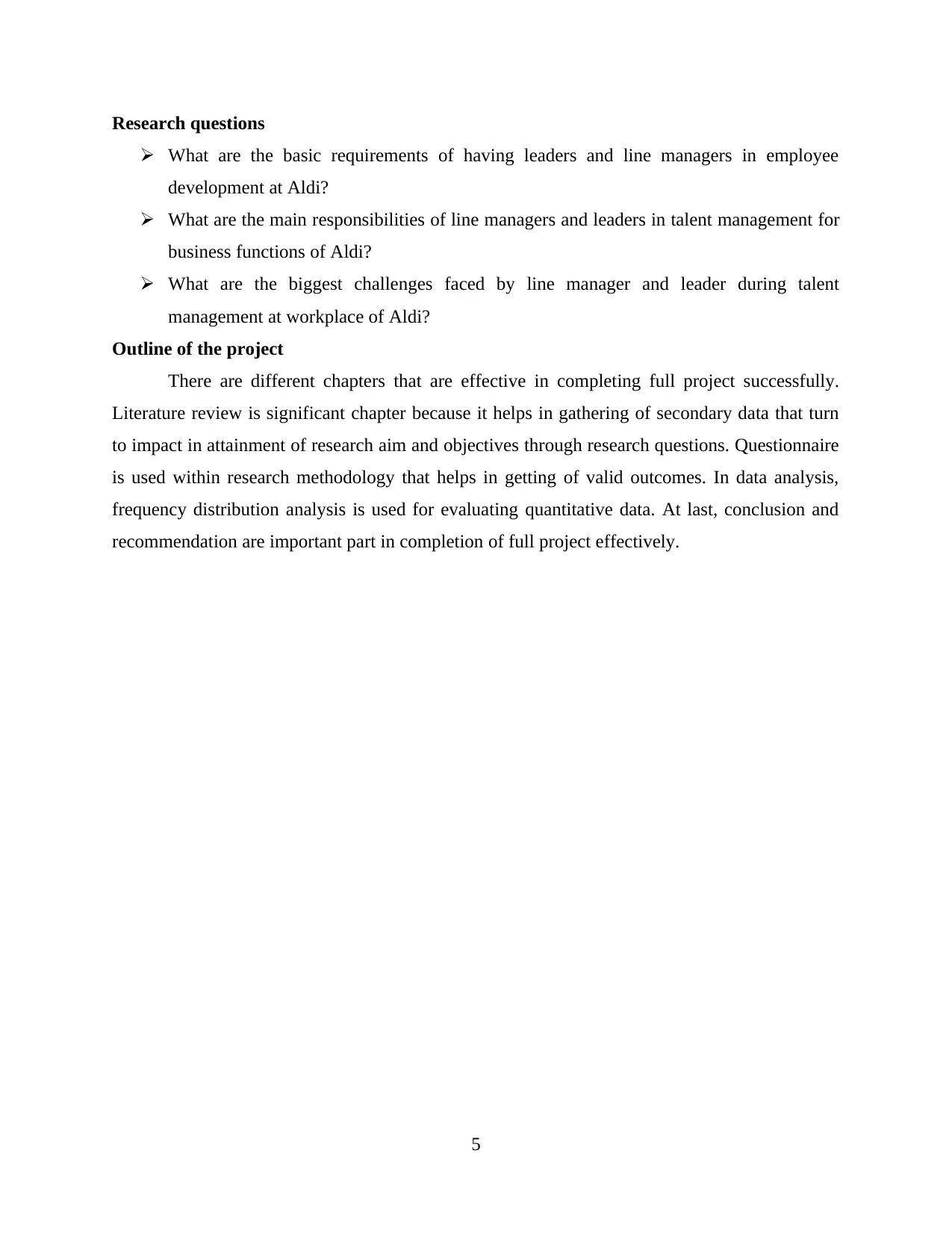
Research questions
What are the basic requirements of having leaders and line managers in employee
development at Aldi?
What are the main responsibilities of line managers and leaders in talent management for
business functions of Aldi?
What are the biggest challenges faced by line manager and leader during talent
management at workplace of Aldi?
Outline of the project
There are different chapters that are effective in completing full project successfully.
Literature review is significant chapter because it helps in gathering of secondary data that turn
to impact in attainment of research aim and objectives through research questions. Questionnaire
is used within research methodology that helps in getting of valid outcomes. In data analysis,
frequency distribution analysis is used for evaluating quantitative data. At last, conclusion and
recommendation are important part in completion of full project effectively.
5
What are the basic requirements of having leaders and line managers in employee
development at Aldi?
What are the main responsibilities of line managers and leaders in talent management for
business functions of Aldi?
What are the biggest challenges faced by line manager and leader during talent
management at workplace of Aldi?
Outline of the project
There are different chapters that are effective in completing full project successfully.
Literature review is significant chapter because it helps in gathering of secondary data that turn
to impact in attainment of research aim and objectives through research questions. Questionnaire
is used within research methodology that helps in getting of valid outcomes. In data analysis,
frequency distribution analysis is used for evaluating quantitative data. At last, conclusion and
recommendation are important part in completion of full project effectively.
5
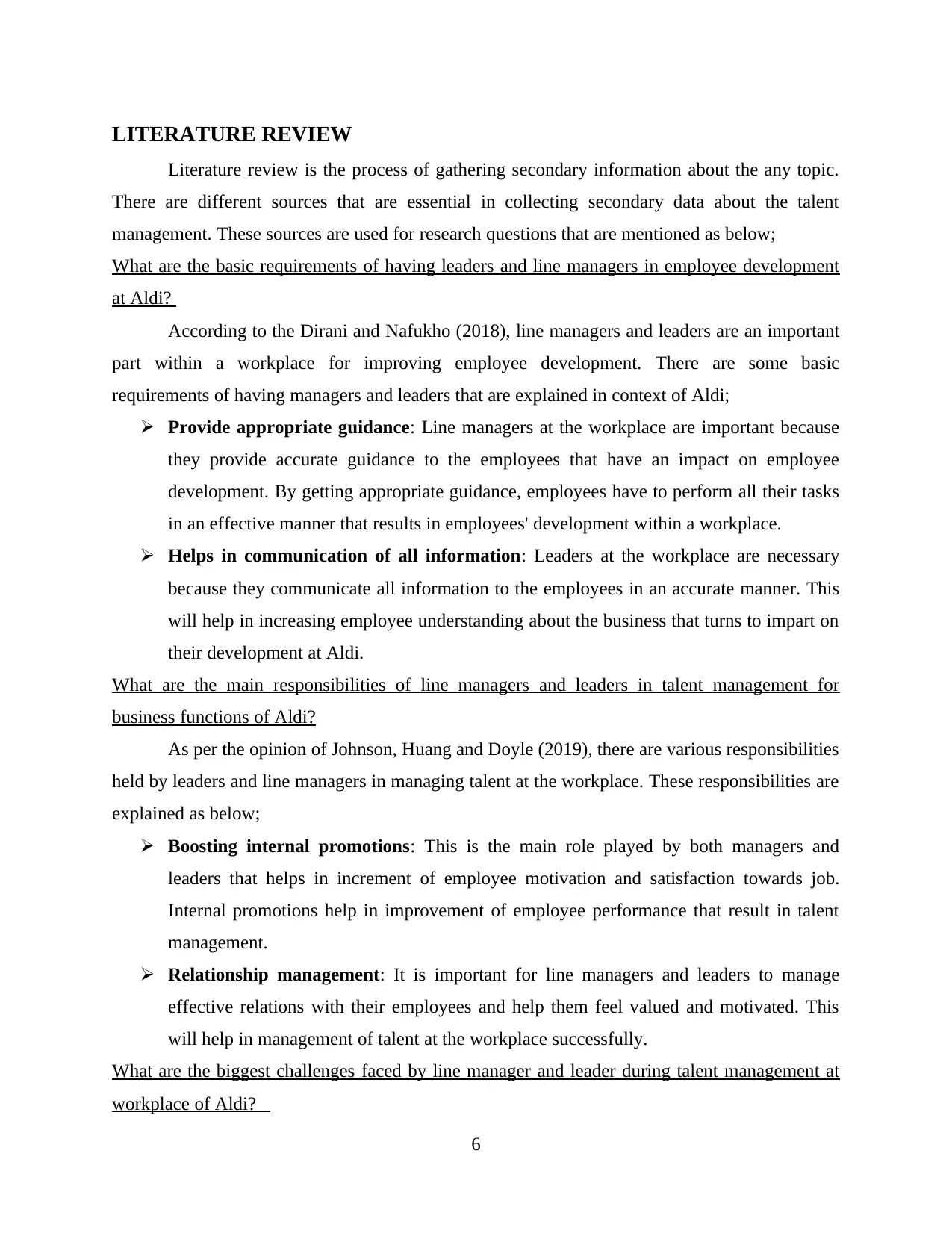
LITERATURE REVIEW
Literature review is the process of gathering secondary information about the any topic.
There are different sources that are essential in collecting secondary data about the talent
management. These sources are used for research questions that are mentioned as below;
What are the basic requirements of having leaders and line managers in employee development
at Aldi?
According to the Dirani and Nafukho (2018), line managers and leaders are an important
part within a workplace for improving employee development. There are some basic
requirements of having managers and leaders that are explained in context of Aldi;
Provide appropriate guidance: Line managers at the workplace are important because
they provide accurate guidance to the employees that have an impact on employee
development. By getting appropriate guidance, employees have to perform all their tasks
in an effective manner that results in employees' development within a workplace.
Helps in communication of all information: Leaders at the workplace are necessary
because they communicate all information to the employees in an accurate manner. This
will help in increasing employee understanding about the business that turns to impart on
their development at Aldi.
What are the main responsibilities of line managers and leaders in talent management for
business functions of Aldi?
As per the opinion of Johnson, Huang and Doyle (2019), there are various responsibilities
held by leaders and line managers in managing talent at the workplace. These responsibilities are
explained as below;
Boosting internal promotions: This is the main role played by both managers and
leaders that helps in increment of employee motivation and satisfaction towards job.
Internal promotions help in improvement of employee performance that result in talent
management.
Relationship management: It is important for line managers and leaders to manage
effective relations with their employees and help them feel valued and motivated. This
will help in management of talent at the workplace successfully.
What are the biggest challenges faced by line manager and leader during talent management at
workplace of Aldi?
6
Literature review is the process of gathering secondary information about the any topic.
There are different sources that are essential in collecting secondary data about the talent
management. These sources are used for research questions that are mentioned as below;
What are the basic requirements of having leaders and line managers in employee development
at Aldi?
According to the Dirani and Nafukho (2018), line managers and leaders are an important
part within a workplace for improving employee development. There are some basic
requirements of having managers and leaders that are explained in context of Aldi;
Provide appropriate guidance: Line managers at the workplace are important because
they provide accurate guidance to the employees that have an impact on employee
development. By getting appropriate guidance, employees have to perform all their tasks
in an effective manner that results in employees' development within a workplace.
Helps in communication of all information: Leaders at the workplace are necessary
because they communicate all information to the employees in an accurate manner. This
will help in increasing employee understanding about the business that turns to impart on
their development at Aldi.
What are the main responsibilities of line managers and leaders in talent management for
business functions of Aldi?
As per the opinion of Johnson, Huang and Doyle (2019), there are various responsibilities
held by leaders and line managers in managing talent at the workplace. These responsibilities are
explained as below;
Boosting internal promotions: This is the main role played by both managers and
leaders that helps in increment of employee motivation and satisfaction towards job.
Internal promotions help in improvement of employee performance that result in talent
management.
Relationship management: It is important for line managers and leaders to manage
effective relations with their employees and help them feel valued and motivated. This
will help in management of talent at the workplace successfully.
What are the biggest challenges faced by line manager and leader during talent management at
workplace of Aldi?
6
⊘ This is a preview!⊘
Do you want full access?
Subscribe today to unlock all pages.

Trusted by 1+ million students worldwide
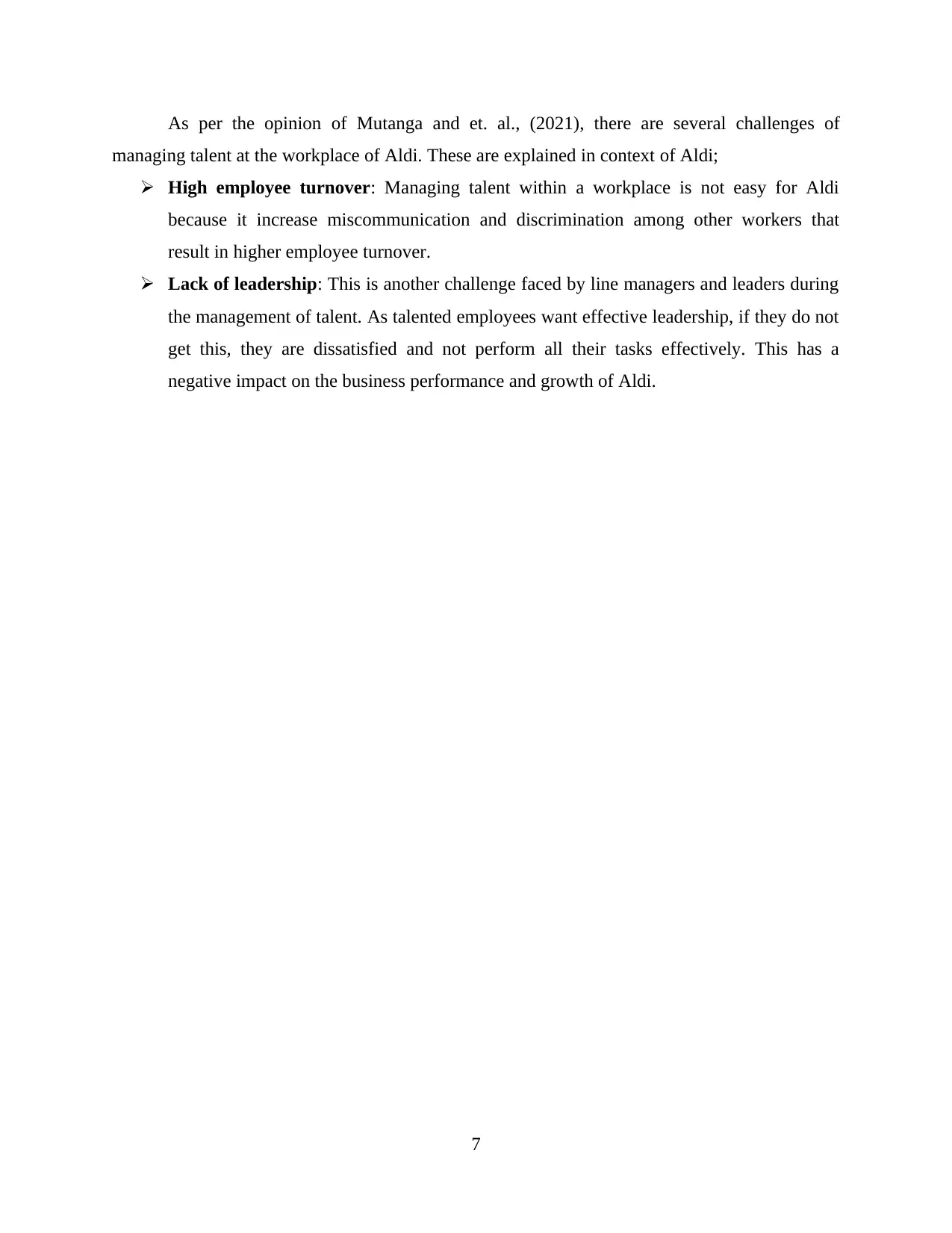
As per the opinion of Mutanga and et. al., (2021), there are several challenges of
managing talent at the workplace of Aldi. These are explained in context of Aldi;
High employee turnover: Managing talent within a workplace is not easy for Aldi
because it increase miscommunication and discrimination among other workers that
result in higher employee turnover.
Lack of leadership: This is another challenge faced by line managers and leaders during
the management of talent. As talented employees want effective leadership, if they do not
get this, they are dissatisfied and not perform all their tasks effectively. This has a
negative impact on the business performance and growth of Aldi.
7
managing talent at the workplace of Aldi. These are explained in context of Aldi;
High employee turnover: Managing talent within a workplace is not easy for Aldi
because it increase miscommunication and discrimination among other workers that
result in higher employee turnover.
Lack of leadership: This is another challenge faced by line managers and leaders during
the management of talent. As talented employees want effective leadership, if they do not
get this, they are dissatisfied and not perform all their tasks effectively. This has a
negative impact on the business performance and growth of Aldi.
7
Paraphrase This Document
Need a fresh take? Get an instant paraphrase of this document with our AI Paraphraser
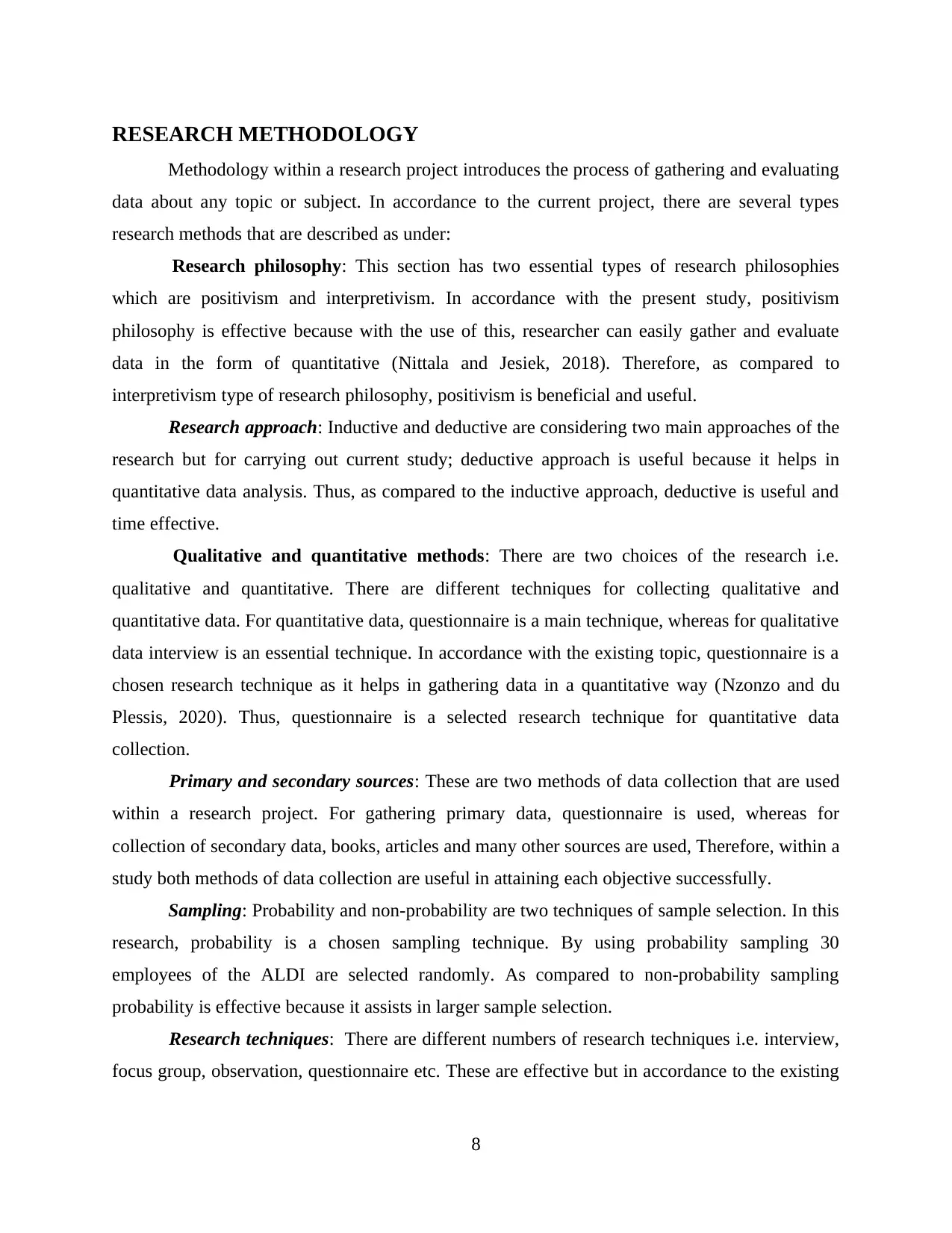
RESEARCH METHODOLOGY
Methodology within a research project introduces the process of gathering and evaluating
data about any topic or subject. In accordance to the current project, there are several types
research methods that are described as under:
Research philosophy: This section has two essential types of research philosophies
which are positivism and interpretivism. In accordance with the present study, positivism
philosophy is effective because with the use of this, researcher can easily gather and evaluate
data in the form of quantitative (Nittala and Jesiek, 2018). Therefore, as compared to
interpretivism type of research philosophy, positivism is beneficial and useful.
Research approach: Inductive and deductive are considering two main approaches of the
research but for carrying out current study; deductive approach is useful because it helps in
quantitative data analysis. Thus, as compared to the inductive approach, deductive is useful and
time effective.
Qualitative and quantitative methods: There are two choices of the research i.e.
qualitative and quantitative. There are different techniques for collecting qualitative and
quantitative data. For quantitative data, questionnaire is a main technique, whereas for qualitative
data interview is an essential technique. In accordance with the existing topic, questionnaire is a
chosen research technique as it helps in gathering data in a quantitative way (Nzonzo and du
Plessis, 2020). Thus, questionnaire is a selected research technique for quantitative data
collection.
Primary and secondary sources: These are two methods of data collection that are used
within a research project. For gathering primary data, questionnaire is used, whereas for
collection of secondary data, books, articles and many other sources are used, Therefore, within a
study both methods of data collection are useful in attaining each objective successfully.
Sampling: Probability and non-probability are two techniques of sample selection. In this
research, probability is a chosen sampling technique. By using probability sampling 30
employees of the ALDI are selected randomly. As compared to non-probability sampling
probability is effective because it assists in larger sample selection.
Research techniques: There are different numbers of research techniques i.e. interview,
focus group, observation, questionnaire etc. These are effective but in accordance to the existing
8
Methodology within a research project introduces the process of gathering and evaluating
data about any topic or subject. In accordance to the current project, there are several types
research methods that are described as under:
Research philosophy: This section has two essential types of research philosophies
which are positivism and interpretivism. In accordance with the present study, positivism
philosophy is effective because with the use of this, researcher can easily gather and evaluate
data in the form of quantitative (Nittala and Jesiek, 2018). Therefore, as compared to
interpretivism type of research philosophy, positivism is beneficial and useful.
Research approach: Inductive and deductive are considering two main approaches of the
research but for carrying out current study; deductive approach is useful because it helps in
quantitative data analysis. Thus, as compared to the inductive approach, deductive is useful and
time effective.
Qualitative and quantitative methods: There are two choices of the research i.e.
qualitative and quantitative. There are different techniques for collecting qualitative and
quantitative data. For quantitative data, questionnaire is a main technique, whereas for qualitative
data interview is an essential technique. In accordance with the existing topic, questionnaire is a
chosen research technique as it helps in gathering data in a quantitative way (Nzonzo and du
Plessis, 2020). Thus, questionnaire is a selected research technique for quantitative data
collection.
Primary and secondary sources: These are two methods of data collection that are used
within a research project. For gathering primary data, questionnaire is used, whereas for
collection of secondary data, books, articles and many other sources are used, Therefore, within a
study both methods of data collection are useful in attaining each objective successfully.
Sampling: Probability and non-probability are two techniques of sample selection. In this
research, probability is a chosen sampling technique. By using probability sampling 30
employees of the ALDI are selected randomly. As compared to non-probability sampling
probability is effective because it assists in larger sample selection.
Research techniques: There are different numbers of research techniques i.e. interview,
focus group, observation, questionnaire etc. These are effective but in accordance to the existing
8
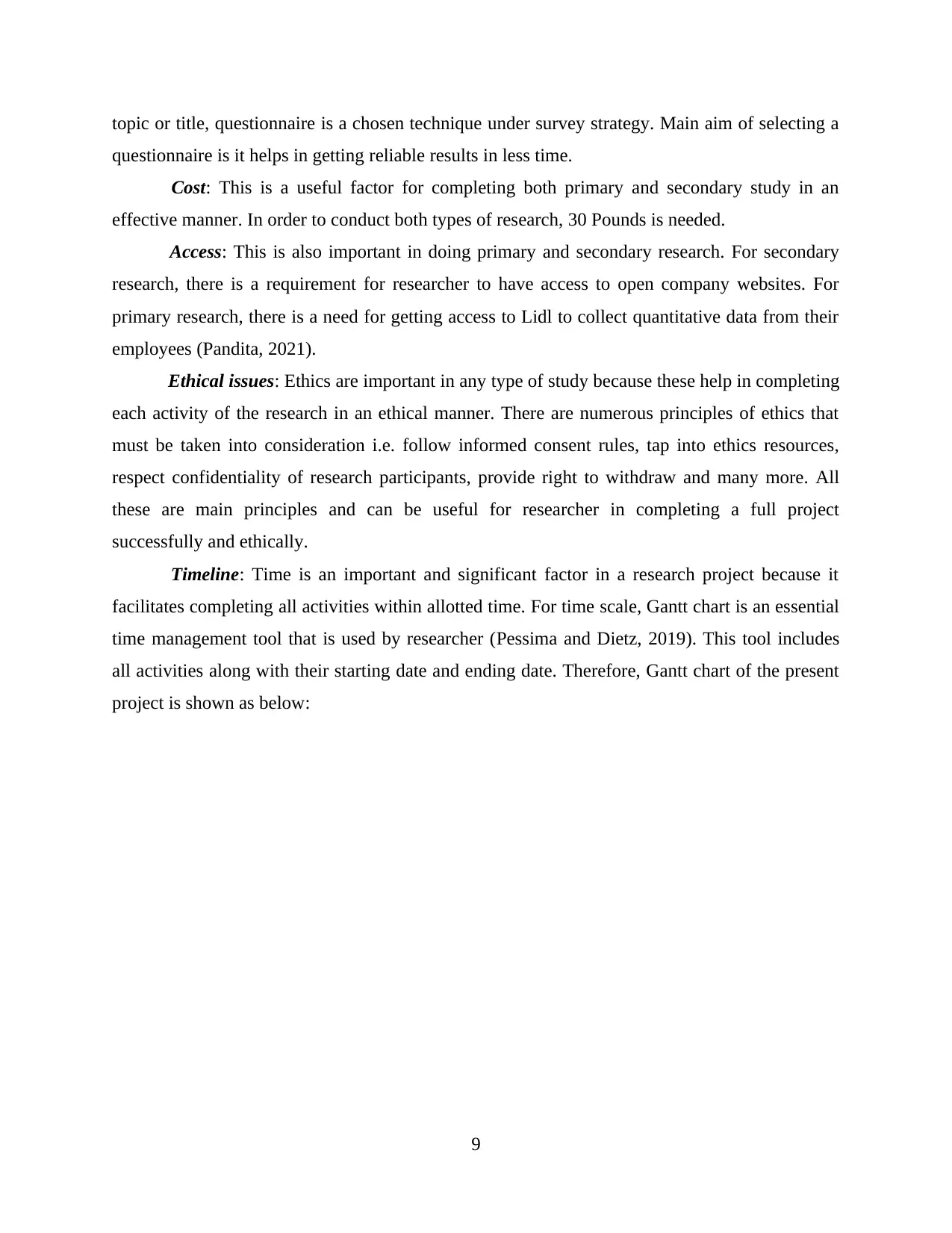
topic or title, questionnaire is a chosen technique under survey strategy. Main aim of selecting a
questionnaire is it helps in getting reliable results in less time.
Cost: This is a useful factor for completing both primary and secondary study in an
effective manner. In order to conduct both types of research, 30 Pounds is needed.
Access: This is also important in doing primary and secondary research. For secondary
research, there is a requirement for researcher to have access to open company websites. For
primary research, there is a need for getting access to Lidl to collect quantitative data from their
employees (Pandita, 2021).
Ethical issues: Ethics are important in any type of study because these help in completing
each activity of the research in an ethical manner. There are numerous principles of ethics that
must be taken into consideration i.e. follow informed consent rules, tap into ethics resources,
respect confidentiality of research participants, provide right to withdraw and many more. All
these are main principles and can be useful for researcher in completing a full project
successfully and ethically.
Timeline: Time is an important and significant factor in a research project because it
facilitates completing all activities within allotted time. For time scale, Gantt chart is an essential
time management tool that is used by researcher (Pessima and Dietz, 2019). This tool includes
all activities along with their starting date and ending date. Therefore, Gantt chart of the present
project is shown as below:
9
questionnaire is it helps in getting reliable results in less time.
Cost: This is a useful factor for completing both primary and secondary study in an
effective manner. In order to conduct both types of research, 30 Pounds is needed.
Access: This is also important in doing primary and secondary research. For secondary
research, there is a requirement for researcher to have access to open company websites. For
primary research, there is a need for getting access to Lidl to collect quantitative data from their
employees (Pandita, 2021).
Ethical issues: Ethics are important in any type of study because these help in completing
each activity of the research in an ethical manner. There are numerous principles of ethics that
must be taken into consideration i.e. follow informed consent rules, tap into ethics resources,
respect confidentiality of research participants, provide right to withdraw and many more. All
these are main principles and can be useful for researcher in completing a full project
successfully and ethically.
Timeline: Time is an important and significant factor in a research project because it
facilitates completing all activities within allotted time. For time scale, Gantt chart is an essential
time management tool that is used by researcher (Pessima and Dietz, 2019). This tool includes
all activities along with their starting date and ending date. Therefore, Gantt chart of the present
project is shown as below:
9
⊘ This is a preview!⊘
Do you want full access?
Subscribe today to unlock all pages.

Trusted by 1+ million students worldwide
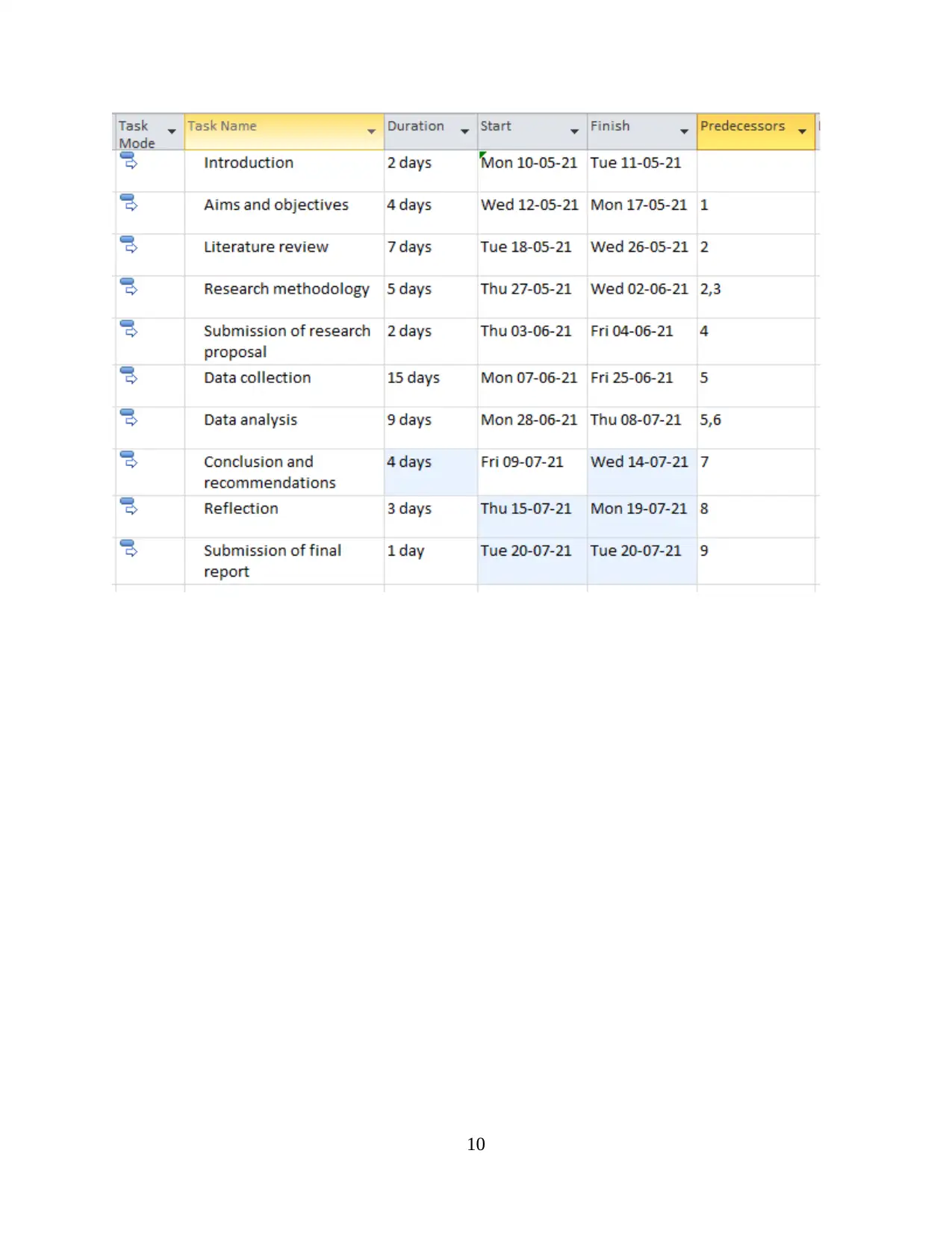
10
Paraphrase This Document
Need a fresh take? Get an instant paraphrase of this document with our AI Paraphraser
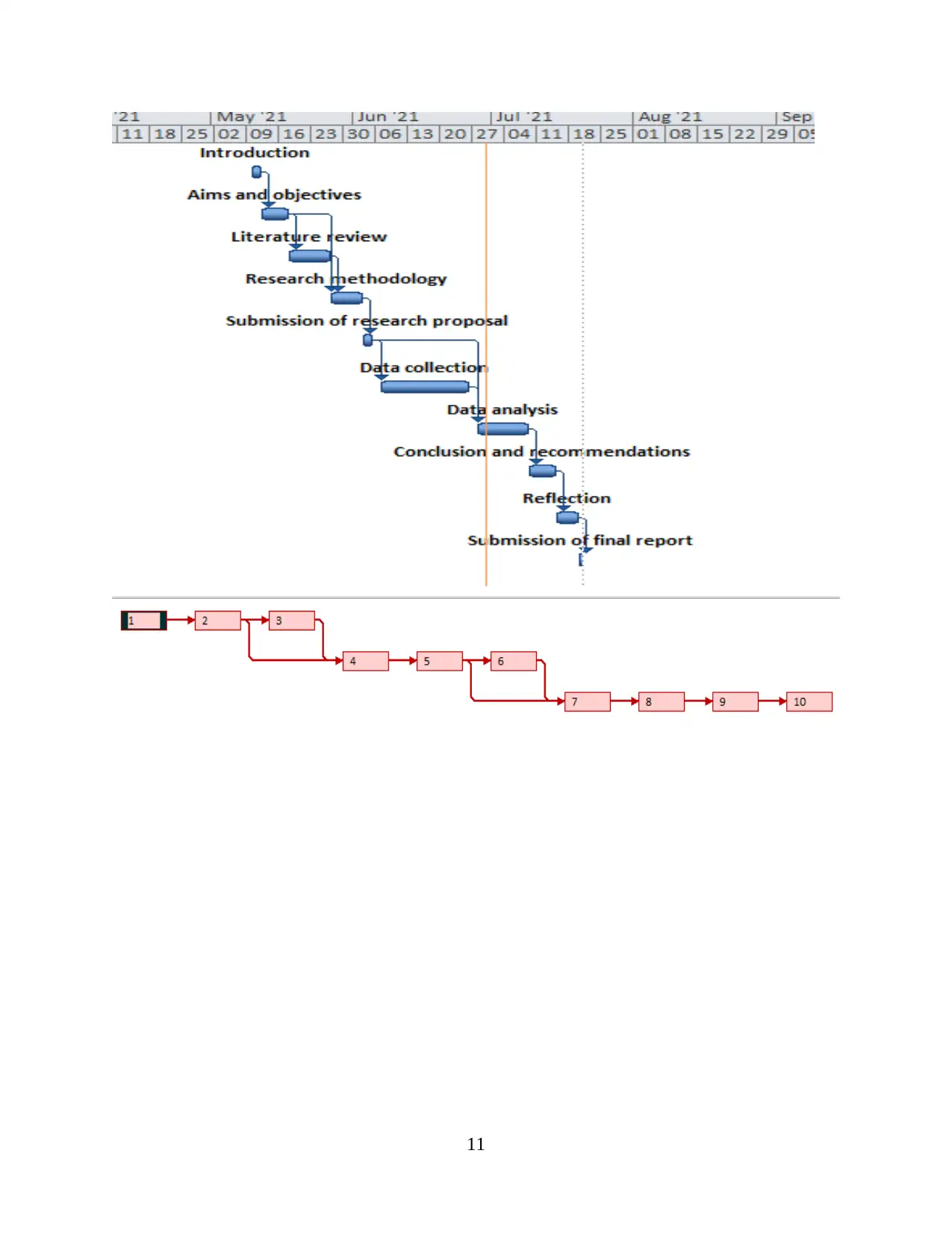
11
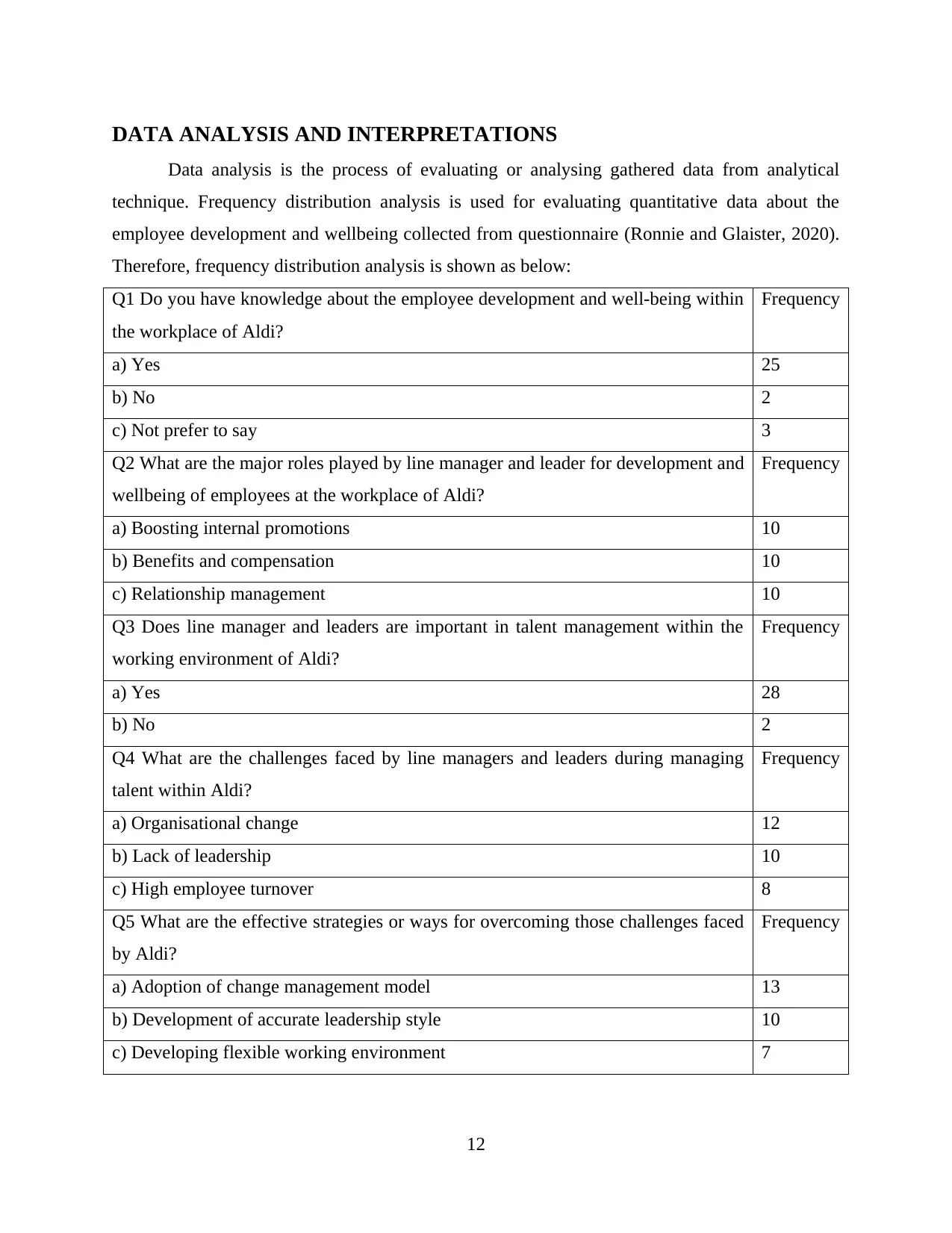
DATA ANALYSIS AND INTERPRETATIONS
Data analysis is the process of evaluating or analysing gathered data from analytical
technique. Frequency distribution analysis is used for evaluating quantitative data about the
employee development and wellbeing collected from questionnaire (Ronnie and Glaister, 2020).
Therefore, frequency distribution analysis is shown as below:
Q1 Do you have knowledge about the employee development and well-being within
the workplace of Aldi?
Frequency
a) Yes 25
b) No 2
c) Not prefer to say 3
Q2 What are the major roles played by line manager and leader for development and
wellbeing of employees at the workplace of Aldi?
Frequency
a) Boosting internal promotions 10
b) Benefits and compensation 10
c) Relationship management 10
Q3 Does line manager and leaders are important in talent management within the
working environment of Aldi?
Frequency
a) Yes 28
b) No 2
Q4 What are the challenges faced by line managers and leaders during managing
talent within Aldi?
Frequency
a) Organisational change 12
b) Lack of leadership 10
c) High employee turnover 8
Q5 What are the effective strategies or ways for overcoming those challenges faced
by Aldi?
Frequency
a) Adoption of change management model 13
b) Development of accurate leadership style 10
c) Developing flexible working environment 7
12
Data analysis is the process of evaluating or analysing gathered data from analytical
technique. Frequency distribution analysis is used for evaluating quantitative data about the
employee development and wellbeing collected from questionnaire (Ronnie and Glaister, 2020).
Therefore, frequency distribution analysis is shown as below:
Q1 Do you have knowledge about the employee development and well-being within
the workplace of Aldi?
Frequency
a) Yes 25
b) No 2
c) Not prefer to say 3
Q2 What are the major roles played by line manager and leader for development and
wellbeing of employees at the workplace of Aldi?
Frequency
a) Boosting internal promotions 10
b) Benefits and compensation 10
c) Relationship management 10
Q3 Does line manager and leaders are important in talent management within the
working environment of Aldi?
Frequency
a) Yes 28
b) No 2
Q4 What are the challenges faced by line managers and leaders during managing
talent within Aldi?
Frequency
a) Organisational change 12
b) Lack of leadership 10
c) High employee turnover 8
Q5 What are the effective strategies or ways for overcoming those challenges faced
by Aldi?
Frequency
a) Adoption of change management model 13
b) Development of accurate leadership style 10
c) Developing flexible working environment 7
12
⊘ This is a preview!⊘
Do you want full access?
Subscribe today to unlock all pages.

Trusted by 1+ million students worldwide
1 out of 34
Related Documents
Your All-in-One AI-Powered Toolkit for Academic Success.
+13062052269
info@desklib.com
Available 24*7 on WhatsApp / Email
![[object Object]](/_next/static/media/star-bottom.7253800d.svg)
Unlock your academic potential
Copyright © 2020–2026 A2Z Services. All Rights Reserved. Developed and managed by ZUCOL.




